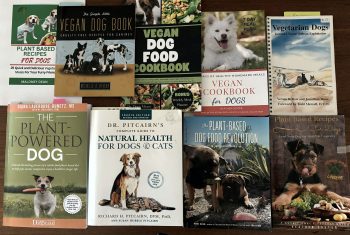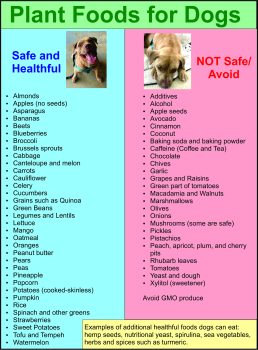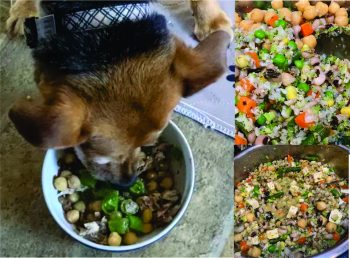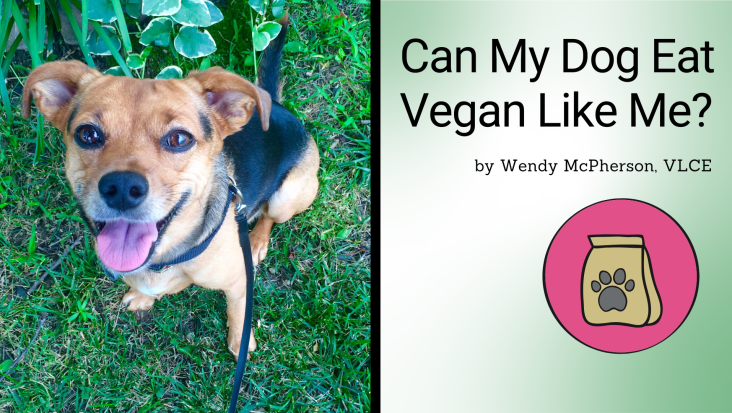posted April 9, 2024
Many ethical vegans struggle with what to feed our canine companions. We understand the horrors of the animal industry and what it does to our health and the environment, yet our veterinarians are not supportive of a vegan (plant-based) diet for dogs. We go against their advice and hope our dog doesn’t develop any illnesses veterinarians will blame on their diet, such as the controversial dilated cardiomyopathy.
So many dogs are getting cancer and chronic diseases and we know it has a lot to do with what they are eating. Most commercial dog food is equivalent to human junk food. Dogs are omnivores and have evolved to eat foods such as grains, legumes, and vegetables, and can thrive on just plants. Bramble, who until recently held the record as the oldest dog, lived 25 years and ate a vegan diet.
The Pet Food Dilemma
Unless we make our dog food, we need to purchase it. When I see food advertised as made with real lamb or cage-free chicken, an image of animal suffering comes to mind and a dagger pierces my heart, especially since farmed animals are often slaughtered as babies. Nevertheless, when we need to purchase dog food, we agonize about which animal suffered more, the innocent chicken or the little lamb. So, what do we do?
Risks of Commercial Animal-Based Dog Food
Commercially made pet food is not fit for human consumption, has minimal oversight, and essentially made of animal waste products containing the 4D’s: Dead, Dying, Diseased, and Disabled or Downed animals (and potentially even euthanized animals). Do we really want to feed that to our dog?
Vegan Dog Food Options
Commercial vegan canned and dry (kibble) dog food is available online. Here is an article about some vegan dog foods.

There is more information about feeding dogs a plant-based diet than ever before. I believe I own every book on the topic, all full of useful information on nutrition and recipes. One of the most recent and comprehensive books and websites is The Plant Powered Dog by Dianee Leverdure-Dunetz. Another book (not shown) is by Jan Allegretti, The Fresh and Flexible Meal Plan.
Several Facebook groups offer support too, and show many examples of healthy dogs that eat only plants. My favorite is Whole Food Plant Based Feeding for Dogs.
Reasons to Feed Our Dog Plants
Feeding our dogs whole food plant-based (WFPB) may help our dog be healthier and live longer. Organic WFPB food is virtually the only way to get organic food since most of the crops used to feed animals are genetically modified. Not only is WFPB food more nutritious and contains more fiber than the alternatives, but also avoids many toxins. And, we know we are doing our best to avoid violence to sentient beings.
Making Whole Food Plant-Based Dog Food

Homemade dog food needs to contain the major nutrients: protein, carbohydrates, fiber, fats, vitamins, minerals, and water. These can be found in legumes and lentils, grains and starchy vegetables, most other vegetables, fruit, seeds, herbs and spices, and sea vegetables. See the image for possible foods to include and foods to avoid. Variety is the best way to provide complete nutrition. I include shredded raw and cooked vegetables and mashed foods such as chickpeas, lentils, and blueberries. I batch cook and freeze in easy-to-use portions.
Will My Dog Eat It?

Some dogs are more receptive to plant foods than others, and it may vary with the breed of dog. There are ways to add plants to the diet of the pickiest eaters, such as mixing in blended, shredded, or mashed vegetables, or toppers and broths. We can feed them plants for treats or share some of our dinner, as long as we don’t feed them foods on the avoid list. Gradually transition your dog to eating more plants.
Feeding my dog, Emma, homemade WFPB dog food was one of the best decisions I made to quickly improve her health, mobility, longevity, and to maintain her ideal weight.
Try It!
Even if our dog can’t be 100% plant-based, any step in that direction is better for their health, animal welfare, and less contamination of the planet. Just like us, the more plants our dogs eat, the better.

Wendy S. McPherson has been an ethical vegetarian since 1988 and vegan since 2010. After retiring as a hydrologist for the U.S. Geological Survey, she wanted to explore ways to help animals, so she attended the April 2019 Main Street Vegan Academy.
She is a 2015 graduate of Cornell University’s T. Colin Campbell Center for Nutrition Studies program in plant-based nutrition and completed Rouxbe’s Forks Over Knives culinary course and Professional Plant-based Certification programs. In addition, she’s led a vegan outreach group called DineKind and taught vegan cooking classes.
Wendy is a member of the Vegan Powered Athlete team and has completed many endurance events fueled by only plants. She lives in Maryland with her partially vegan dog and cat and she has two grown daughters that were raised vegetarian.

